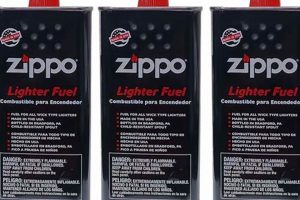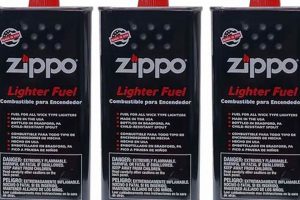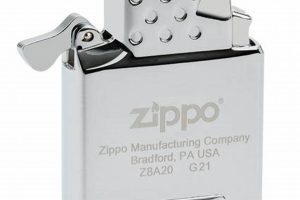Using refined butane, specifically designed for extraction purposes, is crucial when creating butane hash oil (BHO). Standard butane fuel, like that found in Zippo lighters, contains impurities and additives that are unsafe for consumption and can negatively impact the final product’s flavor and purity. These impurities can include heavy metals and other undesirable substances that could be harmful when inhaled or ingested. Utilizing refined butane ensures a cleaner, safer, and higher-quality end product.
Producing BHO with appropriate solvents is essential for consumer safety and product quality. Extraction processes involving butane require a high level of purity to minimize potential health risks and ensure a desirable flavor profile. Historically, the use of impure solvents has led to health concerns and subpar product quality, highlighting the importance of solvent purity in BHO production. Selecting the correct butane is paramount to achieving a safe and enjoyable final product.
This discussion will further explore the importance of solvent purity in extractions, outline the risks associated with using impure butane, and provide guidance on selecting appropriate butane for BHO production. It will also cover best practices for safe extraction techniques and emphasize the importance of responsible BHO production.
Safety and Quality in Butane Extraction
Producing safe and high-quality butane hash oil (BHO) requires careful attention to detail and a thorough understanding of the process. The following tips highlight crucial safety precautions and quality control measures.
Tip 1: Utilize only refined butane specifically designed for extraction. Standard butane fuels, such as those for lighters, contain impurities unsuitable for consumption and can compromise the final product’s quality.
Tip 2: Conduct extractions in a well-ventilated area, preferably outdoors. Butane is highly flammable, and proper ventilation is crucial to prevent explosions.
Tip 3: Wear appropriate safety gear, including gloves and eye protection. This protects against potential exposure to solvents and other hazards.
Tip 4: Use high-quality extraction equipment designed for this specific purpose. Improper equipment can lead to leaks, inefficiencies, and safety risks.
Tip 5: Properly purge the butane from the final product. Incomplete purging can leave residual solvent, which is harmful to consume.
Tip 6: Store BHO in a cool, dark, and airtight container. Proper storage preserves the product’s quality and prevents degradation.
Tip 7: Research and understand local regulations regarding BHO extraction. Regulations vary, and compliance is essential.
Adhering to these guidelines significantly reduces risks associated with BHO extraction and ensures a cleaner, safer, and more enjoyable final product. Prioritizing safety and quality throughout the process is paramount.
By understanding the potential hazards and following recommended safety procedures, individuals can minimize risks and contribute to responsible BHO production. The subsequent conclusion will reiterate these key points and offer further resources for safe extraction practices.
1. Butane Purity
Butane purity is paramount when considering its use in butane hash oil (BHO) extraction. The question “can I use Zippo butane for BHO” hinges directly on this concept. Zippo butane, intended for lighter fuel, contains various additives and impurities unsuitable for human consumption. These impurities can include heavy metals, other hydrocarbons, and performance-enhancing additives. Consuming these substances, even in trace amounts, poses potential health risks. Furthermore, these impurities can negatively impact the flavor, aroma, and overall quality of the extracted BHO. Using impure butane can yield a final product with undesirable tastes, harshness, and potentially harmful contaminants.
For instance, using contaminated butane can result in BHO with a metallic taste or a noticeably unpleasant odor. Moreover, some impurities may not be readily apparent through taste or smell but still pose health risks upon consumption. Conversely, using refined butane, specifically designed for extraction, ensures a cleaner and safer final product. Refined butane undergoes rigorous purification processes to remove impurities, resulting in a higher-quality BHO with a superior flavor profile. This difference in purity has significant implications for the final product’s safety and overall quality.
Therefore, understanding butane purity is essential for anyone considering BHO extraction. Using impure butane like Zippo fuel presents significant health risks and compromises the final product. Opting for refined butane, while more expensive, is a necessary investment for ensuring both safety and quality. The difference directly impacts the consumer’s health and the overall enjoyment of the final product. Prioritizing butane purity is crucial for responsible and safe BHO production.
2. Health Risks
Utilizing standard butane fuel, like that found in Zippo lighters, for butane hash oil (BHO) extraction poses significant health risks. These risks stem from the inherent impurities present in such fuels, not intended for inhalation or ingestion. Standard butane often contains additives and contaminants, including heavy metals and other hydrocarbons, which can have detrimental effects on respiratory health and overall well-being. These contaminants can remain in the final product even after purging, posing risks to consumers. Exposure to these impurities can lead to various respiratory issues, ranging from mild irritation to severe lung damage. Some heavy metals, if accumulated in the body over time, can contribute to long-term health problems, impacting organ function and potentially increasing the risk of certain diseases.
For example, certain additives found in standard butane can cause lipid pneumonia, a serious condition affecting the lungs. Other contaminants may act as irritants, exacerbating existing respiratory conditions like asthma. The lack of regulation and quality control in standard butane fuels makes it impossible to determine the exact composition and potential health risks associated with each specific brand or batch. This uncertainty further amplifies the dangers of using such fuels for BHO extraction. Reports of adverse health effects linked to the consumption of BHO made with impure butane underscore the seriousness of these risks. These cases often involve respiratory complications and other health issues attributed to the presence of contaminants in the final product.
In conclusion, the health risks associated with using Zippo or similar butane for BHO extraction are substantial and cannot be ignored. The potential for both short-term and long-term health complications necessitates the exclusive use of refined butane specifically designed for extraction. This specialized butane undergoes rigorous purification processes to remove harmful impurities, minimizing health risks and ensuring a safer final product. Prioritizing consumer safety requires a clear understanding of these health risks and a commitment to using only appropriate, high-purity solvents in BHO production. Failing to do so can have severe consequences for the health and well-being of consumers.
3. Product Quality
Product quality in butane hash oil (BHO) production is inextricably linked to the purity of the solvent used. The question “can I use Zippo butane for BHO?” directly impacts the final product’s quality due to the inherent differences between standard butane fuels and refined butane intended for extraction. Using subpar butane compromises the quality, safety, and overall experience of the final product. This discussion explores the multifaceted relationship between solvent choice and BHO quality.
- Flavor and Aroma Profile
Impurities in standard butane, such as those found in Zippo lighters, can negatively impact the flavor and aroma of BHO. These impurities can impart undesirable tastes and odors, ranging from a harsh, chemical taste to a lingering metallic aftertaste. Refined butane, free from these contaminants, allows the natural terpene profile of the cannabis plant to shine through, resulting in a superior flavor and aroma experience.
- Consistency and Texture
The solvent used significantly affects the final product’s consistency and texture. Impure butane can lead to a waxy, sticky, or uneven consistency, making handling and consumption difficult. Refined butane allows for a cleaner, more stable extraction, often resulting in a shatter, crumble, or budder consistency, depending on the starting material and extraction techniques.
- Purity and Contaminants
Perhaps the most crucial aspect of product quality is the presence or absence of contaminants. Standard butane contains impurities that can persist in the final BHO product even after purging. These contaminants pose health risks and detract from the overall quality and safety of the concentrate. Refined butane minimizes the risk of contamination, resulting in a purer and safer final product.
- Stability and Shelf Life
The solvent used can also influence the stability and shelf life of BHO. Impurities in standard butane can degrade the final product over time, affecting its flavor, consistency, and potency. Using refined butane contributes to a more stable product with a longer shelf life, preserving its quality and characteristics.
In summary, the choice of solvent in BHO production has profound implications for the final product’s quality. Using Zippo butane or other standard butane fuels introduces significant risks to flavor, aroma, consistency, purity, and stability. Opting for refined butane, specifically designed for extractions, is essential for maximizing product quality and ensuring a safe and enjoyable experience. Understanding this crucial connection between solvent purity and product quality underscores the importance of using appropriate materials in BHO production.
4. Safety Regulations
Safety regulations governing butane hash oil (BHO) extraction underscore the inherent dangers associated with using improper solvents like Zippo butane. These regulations exist to protect public health and mitigate the risks of explosions and fires, common hazards when handling flammable materials like butane. Regulations often stipulate the use of specific equipment, ventilation requirements, and safety protocols to minimize these risks. Using Zippo butane for BHO extraction directly contravenes these safety regulations, as the fuel contains impurities and additives not intended for inhalation or ingestion, creating additional health hazards beyond the inherent dangers of butane extraction. Furthermore, the presence of these impurities can alter the combustion properties of the butane, increasing the risk of uncontrolled reactions and explosions. Ignoring these safety regulations not only jeopardizes personal safety but also carries legal consequences, ranging from fines to criminal charges, depending on the jurisdiction.
For example, many jurisdictions require closed-loop extraction systems for BHO production, specifically designed to contain butane and minimize the risk of leaks and explosions. Using an open-loop system with Zippo butane significantly elevates the risk of fire and explosions due to the uncontrolled release of flammable vapors. Moreover, some regulations mandate specific purity levels for butane used in extractions, explicitly prohibiting the use of impure fuels like Zippo butane. Cases of explosions and fires resulting from improper butane use during BHO extraction illustrate the real-world consequences of disregarding safety regulations. These incidents often lead to severe injuries, property damage, and legal repercussions, highlighting the practical significance of adhering to established safety protocols.
In conclusion, safety regulations surrounding BHO extraction serve a critical purpose in protecting individuals and communities. Using Zippo butane for BHO extraction directly violates these safety regulations, increasing the risk of accidents, health complications, and legal penalties. Understanding and adhering to these regulations is paramount for ensuring safe and responsible BHO production. Prioritizing safety not only protects individuals involved in the extraction process but also safeguards the wider community from the potential hazards associated with improper butane handling. Ignoring these regulations demonstrates a disregard for personal safety and public well-being, highlighting the crucial link between regulatory compliance and responsible BHO production.
5. Extraction Process
The extraction process for butane hash oil (BHO) is crucial for determining the final product’s quality and safety. Understanding this process highlights why using Zippo butane for BHO extraction is strongly discouraged. The process involves dissolving cannabis trichomes in butane, then purging the solvent to leave behind the concentrated cannabinoids and terpenes. Each step is sensitive to the butane’s purity, directly impacting the final result.
- Solvent Choice
Solvent choice is the most critical factor in BHO extraction. Refined butane, specifically designed for extraction, is essential due to its high purity. Zippo butane contains impurities and additives that can contaminate the final product, posing health risks and negatively impacting flavor and aroma. These impurities can also interfere with the extraction process itself, hindering the efficient dissolving of trichomes.
- Dissolution
During dissolution, the butane strips the cannabis plant material of its trichomes, containing the desired cannabinoids and terpenes. Using impure butane like Zippo fuel introduces unwanted substances into this solution. These contaminants can bind with the cannabinoids and terpenes, altering their properties and potentially creating harmful byproducts. Refined butane minimizes this risk, ensuring a cleaner extraction.
- Filtration
Filtration removes plant matter and other unwanted particles from the butane solution. Impurities present in Zippo butane can complicate this process, clogging filters and potentially contaminating the final product. Using pure butane allows for a more efficient filtration process, resulting in a cleaner extract.
- Purging
Purging involves removing the butane from the solution, leaving behind the concentrated BHO. This process requires precise temperature and pressure control to effectively evaporate the butane without degrading the final product. Impurities in Zippo butane can have varying boiling points, making complete purging difficult. Residual butane and other contaminants can remain in the final product, posing significant health risks.
In conclusion, the BHO extraction process is highly sensitive to the purity of the butane used. Using Zippo butane introduces significant risks at each stage, compromising the final product’s quality, safety, and overall desirability. Choosing refined butane is essential for ensuring a clean, efficient extraction process and producing a safe, high-quality BHO product. The potential health risks and negative impact on product quality associated with using impure butane underscore the importance of solvent purity in BHO extraction.
6. Legal Implications
Legal implications surrounding butane hash oil (BHO) extraction vary significantly depending on jurisdiction and local regulations. These legal ramifications are further complicated by the use of impure butane sources like Zippo fuel, which introduces additional health and safety risks. Understanding these legal implications is crucial for anyone considering BHO production.
- Extraction Laws
Many jurisdictions have specific laws regarding the extraction of cannabis concentrates, including BHO. These laws often dictate permissible extraction methods, solvent types, and required safety precautions. Using Zippo butane, with its inherent impurities, could violate these laws, even in jurisdictions where cannabis extraction is otherwise legal. Penalties for violating extraction laws can range from fines and confiscation of equipment to imprisonment.
- Substance Control Laws
Even in jurisdictions where cannabis is legal, the production of BHO may be subject to stricter regulations due to the use of flammable solvents and the potential for misuse. Using impure butane like Zippo fuel adds another layer of legal complexity, as the presence of contaminants may classify the resulting BHO as adulterated, further violating substance control laws. This can lead to enhanced penalties and legal repercussions.
- Health and Safety Regulations
BHO extraction involves inherent risks due to the flammability of butane. Safety regulations aim to mitigate these risks by mandating specific equipment, ventilation requirements, and operating procedures. Using Zippo butane often violates these safety regulations, increasing the risk of accidents and potentially leading to legal liability in case of explosions, fires, or injuries. Non-compliance with safety regulations can result in fines, legal action, and criminal charges.
- Product Liability
Producing BHO with impure butane creates potential product liability issues. If consumers experience adverse health effects due to contaminants present in BHO made with Zippo fuel, the producer may face legal action. Product liability lawsuits can result in significant financial penalties and reputational damage. Using refined butane and adhering to safety regulations minimizes these risks.
In conclusion, the legal implications surrounding BHO extraction are complex and necessitate careful consideration of local laws and regulations. Using Zippo butane for BHO production amplifies these legal risks due to safety concerns, health risks associated with impurities, and potential violations of extraction and substance control laws. Prioritizing compliance with all applicable regulations and using appropriate, refined butane is crucial for mitigating legal risks and ensuring responsible BHO production. Failing to do so can result in severe legal consequences, including fines, criminal charges, and civil lawsuits.
Frequently Asked Questions
This FAQ section addresses common inquiries regarding butane use in butane hash oil (BHO) production, specifically focusing on the suitability of Zippo butane and the importance of using refined butane.
Question 1: Can Zippo butane be used for BHO extraction?
No, Zippo butane is unsuitable for BHO extraction. It contains impurities and additives not intended for inhalation or ingestion. These contaminants can compromise the final product’s quality and pose significant health risks.
Question 2: What are the risks of using impure butane for BHO production?
Using impure butane introduces health risks associated with inhaling or ingesting contaminants. It also negatively impacts the flavor, aroma, and consistency of the final product. Additionally, it can increase safety risks during the extraction process.
Question 3: What type of butane is recommended for BHO extraction?
Refined butane, specifically designed for extraction, is recommended for BHO production. This type of butane undergoes rigorous purification processes to remove impurities, ensuring a safer and higher-quality final product.
Question 4: Where can one purchase refined butane for extraction?
Refined butane for extraction can be purchased from specialized retailers that cater to the cannabis extraction market. It is crucial to source butane from reputable suppliers to ensure quality and purity.
Question 5: How does butane purity affect the quality of BHO?
Butane purity directly correlates with BHO quality. Impure butane can negatively impact flavor, aroma, consistency, and overall safety. Refined butane maximizes quality and minimizes health risks.
Question 6: Are there legal implications associated with using impure butane for BHO extraction?
Yes, using impure butane can have legal implications. It can violate extraction laws, substance control regulations, and safety protocols, leading to fines, legal action, and even criminal charges depending on the jurisdiction.
Using refined butane is paramount for safe and high-quality BHO production. Prioritizing safety and adhering to legal regulations ensures responsible extraction practices.
This information is for educational purposes only and does not constitute legal or medical advice. Consult with qualified professionals for specific guidance.
Conclusion
Exploration of the question “can I use Zippo butane for BHO” reveals significant risks associated with using impure butane in butane hash oil (BHO) extraction. Standard butane fuels, like those designed for lighters, contain impurities and additives unsuitable for human consumption. These contaminants can compromise the final product’s quality, impart undesirable flavors and aromas, and pose significant health risks upon consumption. Furthermore, using impure butane can complicate the extraction process, hinder efficient purging, and increase safety risks due to unpredictable chemical reactions. The potential legal ramifications associated with using impure butane in jurisdictions with regulated cannabis markets underscore the importance of adhering to established safety and quality standards. Conversely, utilizing refined butane, specifically designed for extraction, minimizes these risks and ensures a cleaner, safer, and higher-quality final product. Refined butane’s purity allows for efficient extraction, complete purging, and preservation of the desired terpene profiles, resulting in a superior BHO experience.
The pursuit of high-quality and safe BHO necessitates a commitment to using appropriate, refined butane. Compromising on solvent purity jeopardizes consumer health and undermines the integrity of the final product. Responsible BHO production requires a thorough understanding of the extraction process, adherence to safety regulations, and a commitment to using only the purest, most appropriate solvents. Prioritizing these elements contributes to a safer and more enjoyable BHO experience while mitigating potential health risks and legal complications. The potential consequences of using impure butane underscore the critical importance of solvent purity in responsible and safe BHO production.







